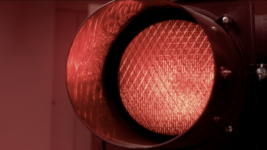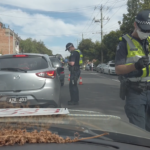I Got a Fine for Running a Red Light, But I Stopped. Can I Fight It?

There’s nothing worse than misjudging the amber traffic light whilst driving, slamming on the brakes to stop as soon as it turns red and noticing the sudden flash of a red light camera.
Here’s an outline of the rules regarding red light camera fines, and whether you can challenge the fine if you stopped before going through the intersection.
How Do Red Light Cameras Work?
A red light camera is a motion sensing camera which will trigger when your vehicle crosses a line into the intersection when the traffic light has turned red.
The camera will take two photos: one as soon as your vehicle has crossed the detection line and a second photo to see whether your vehicle stopped at the line or went through the intersection.
Rules Regarding Running Red Lights
The rules regarding red traffic lights are found under the Road Rules 2014 (NSW).
Regulation 56 of the Road Rules states that a driver approaching or at traffic lights showing a red light must stop:
- If there is a stop line at or near the traffic lights–as near as practicable to, but before reaching, the stop line, or
- If there is a “stop here on red signal” sign at or near the traffic lights, but no stop line–as near as practicable to, but before reaching, the sign, or
- If there is no stop line or stop sign –as near as practicable to, but before reaching, the nearest or only traffic lights,
The maximum penalty for violating regulation 56 in NSW is a fine of $464 and 3 demerit points.
A seperate rule, regulation 59, deals with situations where a driver enters an intersection with a red traffic light. Violating this rule also carries a fine of $488 and 3 demerit points.
Is Stopping Just In Time A Good Defence?
Unfortunately, as regulation 56 deals with crossing a certain stop line, sign line or when reaching the traffic lights it does not matter whether you actually entered the intersection.
You may still have a defence however if:
- The red light camera was triggered in error;
- You stopped before the stop line, sign line or before reaching the traffic lights (depending on the circumstances); or
- You were not driving the vehicle at the time.
Fighting A Traffic Fine
If you believe that you have been fined in error, or that there were special circumstances which led to the offence that mean you have been fined unfairly then you can request a review as outlined in Division 2A of the Fines Act 1996.
You can do this over the phone, or with a traditional posted letter, but the easiest way is online. You need:
- proof of your identity such as your address, date of birth or driver licence number
- your penalty notice number
- the date of the offence
- any supporting evidence (examples and more information is available in the Review Guidelines).
There are three potential outcomes of such a review: the penalty remains, you are let off with a caution, or the penalty is cancelled.
It’s also open for you to take the matter to court before a Magistrate, which can often result in more beneficial outcomes.
Request a Review of a Fine
An individual can request a review of a fine, whether overdue, a notice, or a reminder notice, if the person believes a mistake has been made or there were special circumstances attributed to the incident.
Revenue NSW considers each individual’s situation and circumstances surrounding receiving the fine. Either the fine stands, the person is left with a caution, or the fine is cancelled.
The person requesting the review should first consider images of the offence and the person responsible to build a defence to fight the fine successfully.
Best Defence for Fighting a Traffic Offence in NSW
You can contest a traffic offence based on the following:
- Belief that the fine was issued in error,
- Fine incorrectly issued,
- Other factors causing the committal of the offence,
- Extenuating circumstances, or
- Leniency based on a clean driving record.
There are numerous factors that Revenue NSW will take into account when considering the severity of a traffic offence or red light camera offence:
- The presence of a mistake in issuing the fine,
- If the person involved was driving the car at the time of the traffic offence,
- If the offence involved a safety issue,
- If the offender suffers from a mental illness or disability,
- If the offence was committed during a medical emergency, and
- If the offender’s driving record is clean.
The possible outcomes for reviewing the fine are either:
- Penalty to stand—Revenue NSW states that the person is guilty of the offence and requires the person to make a payment or have the fine reviewed in court.
- Caution — Revenue NSW gives the person a caution without a fine or demerit points lost.
- Cancellation — Revenue NSW claims the fine was incorrectly issued, and the person does not need to make a payment or lose points on their driving record.
Going to court for a traffic offence?
If you are going to court for a traffic offence, call or email Sydney Criminal Lawyers anytime to arrange a free first consultation with an experienced, specialist traffic lawyer who will accurately advise you of your options, the best way forward, and fight for the optimal outcome in your specific situation.






